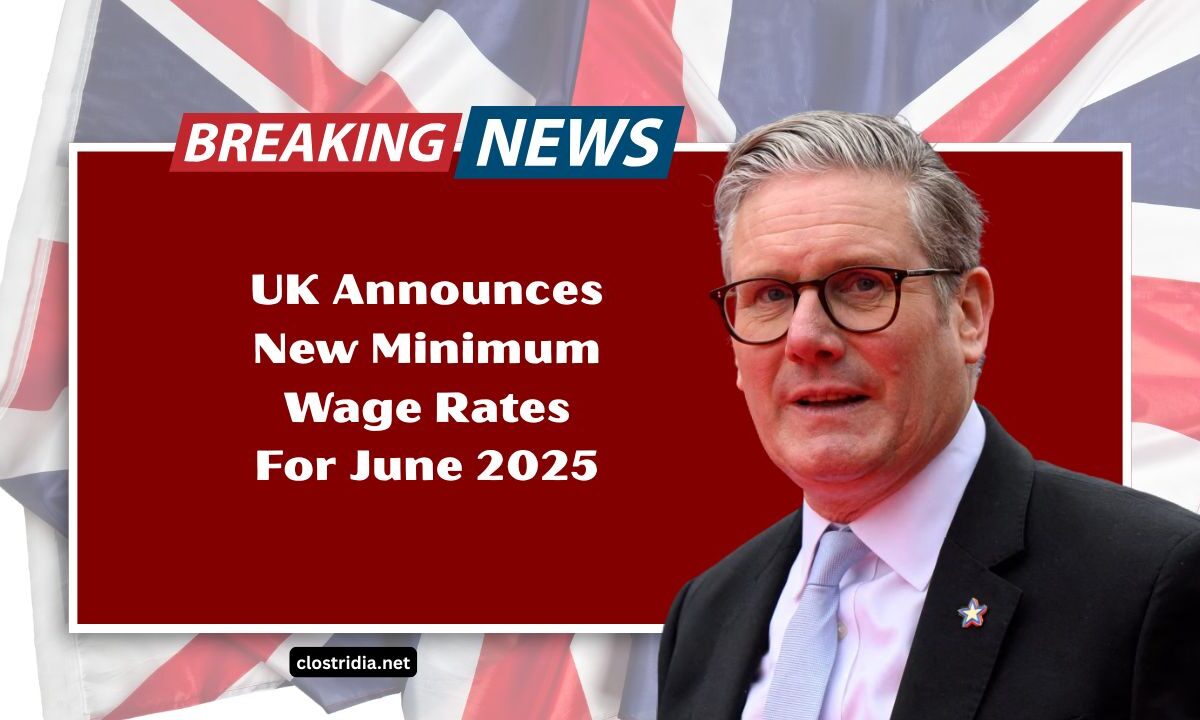In a major policy update aimed at addressing the rising cost of living and reducing wage inequality, the UK government has confirmed a new national minimum wage structure, which will come into effect in June 2025.
This wage increase is expected to directly benefit millions of workers across a variety of sectors, especially those in low-income roles.
Backed by the recommendations from the Low Pay Commission, this decision is part of the government’s broader plan to transition to a high-wage, high-skill, and high-productivity economy.
The new wage rates are intended to better align with the rising cost of living, while also ensuring fairer pay for vulnerable workers, including younger employees and apprentices.
UK New Minimum Wage for June 2025
The UK’s economic environment has been marked by persistent inflation, rising energy bills, and the increasing cost of everyday necessities such as groceries and rent.
As families continue to feel the financial pressure, increasing the minimum wage has been seen as a crucial measure to protect workers and boost their real earnings.
This minimum wage hike is part of a larger government agenda aimed at reducing in-work poverty and narrowing the income gap between various age groups.
The key objective is to ensure that working individuals are adequately compensated, thus preventing low-wage workers from falling further behind in the economic race.
UK Minimum Wage Breakdown for June 2025
| Topic | Details |
|---|---|
| Implementation Date | June 2025 |
| National Living Wage Eligibility | Workers aged 21 and over |
| Highest Raise | Apprentices: 8.6% |
| Target for 2026 | Two-thirds of median earnings for NLW |
| Enforcement Authority | HMRC (on behalf of the Department for Business & Trade) |
| Objective | Reduce in-work poverty, increase productivity |
Updated Minimum Wage Rates Breakdown
The following is a breakdown of the updated minimum wage rates compared to their previous levels:
| Category | Previous Rate (2024) | New Rate (June 2025) | Percentage Increase |
|---|---|---|---|
| National Living Wage (21+) | £11.44 | £11.95 | 4.5% |
| 18–20 Year Olds | £8.60 | £9.15 | 6.4% |
| 16–17 Year Olds | £6.40 | £6.90 | 7.8% |
| Apprentices | £6.40 | £6.95 | 8.6% |
| Accommodation Offset (daily) | £9.99 | £10.50 | 5.1% |
Notable Updates and Key Changes
- National Living Wage (NLW): The NLW now applies to workers aged 21 and over, as opposed to the previous threshold of 23+. This change expands eligibility and brings in a significant number of additional workers under this higher pay scale.
- Apprentices: The pay for apprentices has been increased by 8.6%, making it the highest percentage increase across all categories.
How Workers Will Benefit
This increase in the minimum wage is expected to positively impact the financial stability of a large portion of the workforce. Sectors such as retail, hospitality, social care, and food service, which rely heavily on minimum wage workers, will see the most significant effects.
Key benefits for workers include:
- Increased Take-home Pay: Annual earnings may rise by between £600 and £1,000, depending on the number of hours worked each week.
- Better Budgeting: Higher wages will help workers better meet everyday expenses such as rent, groceries, and transportation.
- Improved Financial Security: This increase enables workers to save, reduce debt, and better handle emergencies.
What Employers Need to Know
Employers across the UK are required by law to adopt these new minimum wage rates from June 2025. Non-compliance could lead to penalties, fines, and potential damage to the company’s reputation.
Steps employers should take:
- Update Payroll Systems: Ensure that new hourly rates are reflected in payroll systems.
- Revise Employee Contracts: Update contracts where necessary to reflect the changes in pay rates.
- Adjust Budgets: Plan for the increased payroll costs and adjust staffing plans accordingly.
- Communicate Changes Clearly: Keep employees informed about the changes to avoid confusion and maintain transparency.
While some small businesses may feel the financial strain initially, higher wages are expected to yield long-term gains through better employee retention, improved productivity, and increased job satisfaction.
The minimum wage increase scheduled for June 2025 is a crucial step toward addressing rising living costs and ensuring fair pay for workers across various sectors in the UK.
This wage increase will help reduce in-work poverty and enhance financial stability for low-income workers, especially in vulnerable groups.
FAQs
What is the new National Living Wage rate for June 2025?
The new rate for workers aged 21 and over will be £11.95, reflecting a 4.5% increase.
Will apprentices benefit from this wage increase?
Yes, apprentices will see an 8.6% increase in their wage rate, bringing their pay to £6.95 per hour.
How will this wage increase affect workers in the UK?
Workers can expect increased take-home pay, better financial security, and a reduced pay gap, especially among younger workers.

